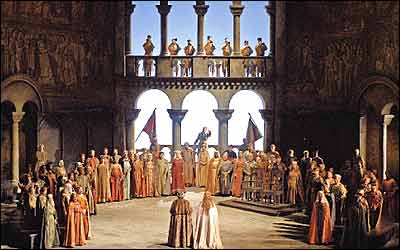
Photo Credit: Marty Sohl/Courtesy of the Metropolitan Opera
Contemporary Wagner productions don’t get more conservative than the Metropolitan Opera’s 1977 staging of Tannhäuser, a neo-Romantic view of this medieval contest between good and evil, spirit and flesh, old and new, that even operatic liberals begrudgingly admit has always looked very handsome. And it continues to take the breath away in the current revival. The production team that dreamed it up—director Otto Schenk and designer Günther Schneider-Siemssen—went on to create many more Met spectacles in the same style, but with diminishing returns. Whatever it is that makes their Tannhäuser still seem so fresh and poetic turned stale when they tackled the “Ring” cycle a few years later, reducing a mighty epic to a brainless romp through a Wagnerian theme park.
Perhaps the Schenk–Schneider-Siemssen Tannhäuser worked because the opera is based on actual events in real places from the distant past (the thirteenth century), all of it shrouded in the rosy mist that settles over any favorite historic legend after countless retellings place it in a romantic-realist world. Interviewing Schneider-Siemssen before the first performance in 1977, I was fascinated to hear him describe how closely he had studied medieval paintings that depict the countryside of Thuringia, where the opera takes place, taking great pains to make his sets reproduce the shades of the ocher earth and the contours of beech-tree clusters in springtime. Anyone who has visited Wartburg Castle, where Tannhäuser and his fellow minstrels competed for the favors of the saintly Elisabeth, can scarcely fail to be impressed by how uncannily this hall of song reflects the original.
Schenk’s typical laissez-faire directorial methods also seem right for the opera, where the basic tensions are clearly established, played out without interpretive gimmicks, and reach a climax as Tannhäuser, repentant after a sinful dalliance with the love goddess Venus, returns from his Roman pilgrimage to find death and redemption through the intercession of Elisabeth. Schenk pretty much leaves the audience to ponder the significance of it all. Is the opera simply a cautionary morality tale? A conflict between a conservative and progressive society? The age-old struggle of the visionary artist who is destroyed when he tries to impose new ideas on his reluctant contemporaries? This Tannhäuser is perhaps all the more effective for not forcing a specific concept down our throats.
A production of this sort depends more than most on the cast, and the current one makes a strong favorable impression. Indeed, I’ve not heard many tenors survive the killing title role with more honor than Peter Seiffert, for many years a much admired singer in Europe who is finally making his Met debut. Seiffert now has the heft, muscle, and stamina to stay the course, and yet his tenor has lost very little of the lyrical impulse that graces his approach to less heroic roles. I’ve seen more thrillingly crazed Tannhäusers recount their tortured journey to Rome and rejection by the pope, but few manage to tell the tale with more vocal finesse and expressive shading.Thanks to her well-publicized sufferings at the hands of a cruel, fattist opera management and her recent dramatic weight loss, Deborah Voigt can count on sympathetic ovations the moment she appears onstage. Voigt does in fact present a very appealing picture of blonde Teutonic virginity as Elisabeth, but I can’t say her generously sung if generic portrayal adds much to the performance history of the role. Surely she should give us some tangible indication of Elisabeth’s inner turmoil—after all, the woman’s sexual tensions, courageous defiance of a male society, and despair over Tannhäuser’s betrayal literally kill her. During the Act Two finale, when all this agony erupts, Voigt does little more than kneel piously, clasp her hands, and do some very pretty singing. I can’t help recalling how Leonie Rysanek played the scene when this production was new, her diamantine voice soaring over the male ensemble as she painfully carried herself across the stage, confronted a broken Tannhäuser, and bent over him like a weeping Madonna granting forgiveness.
But that’s part of the beauty of this production, which allows an artist like Rysanek full scope to create such moments. In a quieter way, Thomas Hampson, as Wolfram, achieves much the same effect in the present revival. Usually presented as an Establishment goody-goody, this Wolfram seems more than slightly dangerous and subversive as he pushes the envelope in any number of subtle ways to show his support of Tannhäuser, if only by being an intent and involved listener. Beyond that, the role’s lyrical music is ideal for Hampson’s silky, purling baritone and ability to shape such elegant lyrical lines.
The sultry Venus of Michelle De Young and upright Landgraf of Kwangchul Youn lend solid support without putting any remarkable fresh perspectives on the roles. The orchestra, on the other hand, plays the more elaborate Paris version of the score with an uncommonly plush, spacious sonority that never loses its sense of forward motion. The credit for this goes to conductor Mark Elder, who finds colors, nuances, and dramatic points in the music that in every way complement the visual distinction of this classic production.
The flap over Deborah Voigt’s Covent Garden nonappearance in March wasn’t her only controversy of late. In October, having signed on for a production of Der Rosenkavalier at the Vancouver Opera, “the diva arrived a week late for rehearsals but everyone understood,” reported the Toronto Star. “A resident of Florida, she had just come through some terrifying hurricanes. What everyone did not understand was her unpreparedness. It soon became apparent that she was not ready.” Voigt’s managers soon announced that she’d drop out of the production—releasing the unfortunately worded statement that she’d “stretched herself too thin.”
Tannhäuser
Directed By
Otto Schenk
Metropolitan Opera. Through December 18.